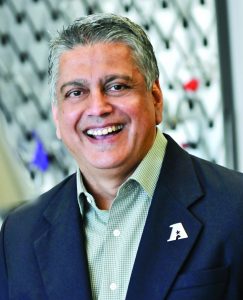 Krishnan Rajeshwar, past ECS president, editor-in-chief of the ECS Journal of Solid State Science and Technology, and a leading researcher in solar fuels, was recently featured on the podcast Conceptual Science where he discusses solar fuels, their chemistry, challenges, and prospects. Co-hosts John and Tracy Suchocki describe the interview as one of their more technical episodes—what better audience to tune in that ours! So if you’re into chemical reactions, particularly oxidations and reductions, this may be of interest. (more…)
Krishnan Rajeshwar, past ECS president, editor-in-chief of the ECS Journal of Solid State Science and Technology, and a leading researcher in solar fuels, was recently featured on the podcast Conceptual Science where he discusses solar fuels, their chemistry, challenges, and prospects. Co-hosts John and Tracy Suchocki describe the interview as one of their more technical episodes—what better audience to tune in that ours! So if you’re into chemical reactions, particularly oxidations and reductions, this may be of interest. (more…)
Harry Atwater is working on the forefront of alternative energy technologies. From his research in solar fuels to his innovation in photovoltaics, Atwater’s work addresses the energy crisis and strives to provide a more secure, sustainable future.
Currently, Atwater is the Howard Hughes Professor of Applied Physics and Materials Science at the California Institute of Technology (Caltech) and Director of the Joint Center for Artificial Photosynthesis (JCAP). You can catch Atwater at the fifth international ECS Electrochemical Energy Summit, taking place October 12th through the 14th 2015 in Phoenix, AZ.
Listen and download this episode and others for free through the iTunes Store, SoundCloud, or our RSS Feed. You can also find us on Stitcher.
 There is currently a strong incentive among the scientific community to research clean, renewable energy sources to address challenges in sustainable global development. Through solar fuels, scientists can convert solar energy to chemical energy stored in chemical fuels such as clean-burning hydrogen.
There is currently a strong incentive among the scientific community to research clean, renewable energy sources to address challenges in sustainable global development. Through solar fuels, scientists can convert solar energy to chemical energy stored in chemical fuels such as clean-burning hydrogen.
Solar fuels started to really accelerate in 1972 when Akira Fujishima and Kenichi Honda developed a titanium dioxide-based photoelectrochemical cell to split water to generate hydrogen.
Now, researchers from Eindhoven University of Technology have discovered a new way to improve upon this process through the novel way of processing the material gallium phosphide (GaP).


